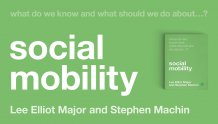Articles
Articles

The book is is a comprehensive review of social mobility ever published, reviewing evidence from hundreds of studies and historical and international trends over the last 80 years.
Fundamental reset of society needed to prevent decline in social mobility in the post-Covid era, experts warn
A fundamental reset of society is needed to avert an unprecedented decline in social mobility in the post-Covid era, leading experts have warned.
A one-off wealth tax, more extensive vocational education and ballots to allocate places randomly at over-subscribed universities and schools could help to create a more inclusive, collective society and a more productive economy, they argue in a new book.
Professor Lee Elliot Major, of the University of Exeter, and Professor Stephen Machin, of the London School of Economics, say the pandemic offers the chance of a new dawn of renewed thinking. The policy reforms they suggest include:
- a one-off progressive wealth tax assessed on the net worth of the top 1 per cent of richest individuals
- guaranteed jobs and training for those who are at risk of long-term unemployment, particularly outside London
- a vocational stream in schools alongside current academic routes, to link schools with the workplace - and a general school certificate every pupil is expected to pass
- a national social-mobility service for university students and graduates to tutor disadvantaged children, and for mentoring in the workplace
- ballots to allocate places randomly at over-subscribed universities, schools and employers where candidates have met selection criteria
“We now live in an unfair, winner-takes-all society where life prospects are determined too much by who you happen to be born to and where you are born. Just doing better than previous generations, let alone climbing the social ladder, has become a broken dream for many people,” Professor Elliot Major said
In What Do We Know And What Should We Do About… Social Mobility? Professor Elliot Major and Professor Machin point out changes to the workplace means many people are in poorly-paid, temporary dead-end jobs, lacking basic rights or entitlements. The graduation gap between rich and poor, meanwhile, has widened over the last 40 years despite the expansion of universities. Many on the lower rungs of the social ladder now face the spectre of long-term unemployment and lifelong education scarring.
The book is is a comprehensive review of social mobility ever published, reviewing evidence from hundreds of studies and historical and international trends over the last 80 years.
The goal of social mobility should not just be about catapulting a fortunate few into elite universities and prestigious professions, but creating decent jobs and lives for all across the country, the academics say.
Professor Elliot Major and Professor Machin also say there is a “strong argument” for introducing a regional weighting to the national pupil premium money for disadvantaged pupils – providing significantly more money to turn around areas of multigenerational poverty.
Professor Elliot Major said: “There is a delicate balancing act between protecting the freedoms of families to pursue opportunities and the need to promote the prospects of the most disadvantaged in society. But for too many, the fairness test is being failed.
“Younger generations face the spectre of downward social mobility which will lead to increasingly contested battles over fewer opportunities. A fundamental shift in the debate is required. It was needed before the COVID-19 crisis, and has become even more pressing now as the vulnerable in society are suffering most from the global economic recession triggered by the pandemic.”
Professor Machin said: “The triple whammy of the global financial crisis, Brexit and COVID-19 has not been good for current and future social mobility. COVID-19 looks set to increase the toxic mix of rising economic and education inequality. Failure to do something will store up greater problems for future generations.”
Date: 25 September 2020
